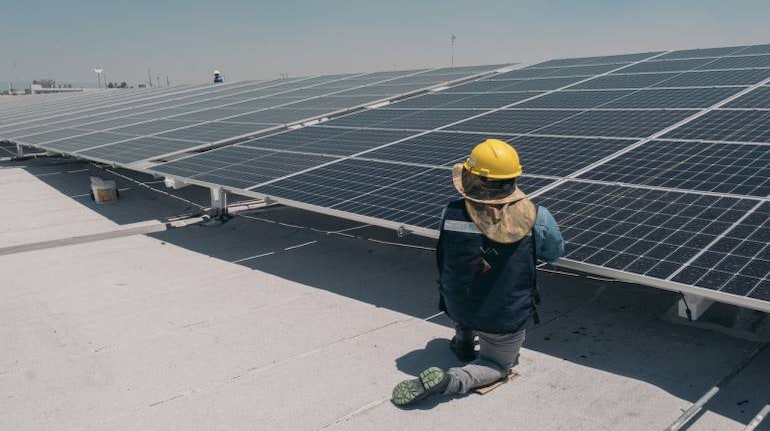



The Government of India is going to identify one crore households that consume up to 300 units of electricity per month for its recently announced domestic rooftop solar scheme - 'Pradhan Mantri Suryoday Yojna'. More importantly, such households will not have to pay for solar installations on their rooftops, Union minister for power and new and renewable energy RK Singh said on February 2.
The Interim Budget presented by Finance Minister Nirmala Sitharaman on February 1 mentioned the rooftop solar scheme for households. In her Budget speech, the FM said solar installations in such households will result in savings of about 300 units of electricity per month. "On an annual basis, the scheme could result in savings of Rs 15,000-18,000 for households that install rooftop solar systems," she said.
A day after the budget, Singh, providing further clarity on the scheme, said those who availed low-income houses under the Pradhan Mantri Awas Yojna will be considered in this. "We will also go beyond Pradhan Mantri Awas Yojna to identify houses that consume up to 300 units electricity per month. The scheme is being designed in such a way that such households will not have to pay anything for the rooftop solar installations," the Union minister for power said in an interaction with reporters.
Also read: Discoms to be mandated timelines for rooftop solar projects execution: RK Singh.
The government has appointed eight central public sector undertakings (CPSUs) to implement the scheme across all states and union territories of the country. These CPSUs will be responsible for installation of rooftop solar in one crore households.
When asked how the CPSUs will fund this programme, Singh said, the government will increase the existing subsidy for rooftop solar to 60 percent from the current 40 percent which will be given to the CPSUs. The remaining 40 percent of the funding will be through loans which the CPSUs will take from institutions like REC Ltd, which is also the nodal agency for the programme.
He said the loan will be taken by special purposed vehicles (SPV) set by the CPSUs assigned for a particular state. "They will set up SPVs for implementing this. They will take the loans. So, 300 units generated through the rooftop solar will offset the monthly electricity bill of that household. And the excess unit of solar power that will be generated, will go to pay off the loan taken by the CPSUs," Singh said, adding that the loan tenure is expected to be up to 10 years.
Also read: Solar module makers will soon have to follow 'Make in India' trajectory: RK Singh
Post the 10-year period when the loan is repaid, the rooftop solar infrastructure would be transferred to the household, which would then themselves be able to sell their excess power to the discoms, the Union minister said.
On January 22, Prime Minister Narendra Modi announced that his first decision after returning from Ayodhya following the consecration ceremony at the Ram temple was to launch the Pradhan Mantri Suryoday Yojna in in one crore houses.
To be sure, a residential rooftop solar (RTS) scheme is already in place, which is now being upgraded with new guidelines and incentives by the Ministry of New and Renewable Energy (MNRE). The ministry launched the existing 'Rooftop Solar Programme Phase-II' on March 8, 2019 with an objective to achieve 4,000 MW of RTS capacity in the residential sector by providing subsidy or Central Financial Assistance (CFA). However, until November, 2023, the capacity installed under the RTS Phase-II subsidy scheme was 2651.10 MW.
Homes consuming above 300 units to get subsidy for rooftop solar
The scheme will also be open for households that consume more than 300 units of electricity per month. But, such houses will have to get the rooftop panels installed on their own, even as they will be eligible for the enhanced subsidy on the cost of installation.
Low cost financing for rooftop solar is already available and the government is in the process of revamping its vendor list by rating them and also rating the quality of solar panels for consumers to make an informed decision.
Discover the latest Business News, Sensex, and Nifty updates. Obtain Personal Finance insights, tax queries, and expert opinions on Moneycontrol or download the Moneycontrol App to stay updated!
Find the best of Al News in one place, specially curated for you every weekend.
Stay on top of the latest tech trends and biggest startup news.